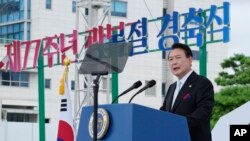ປະທານາທິບໍດີ ເກົາຫຼີໃຕ້ ທ່ານ ຢູນ ຊຸກ ຢອລ ໄດ້ກ່າວໃນວັນພຸດມື້ນີ້ວ່າລັດຖະບານຂອງທ່ານບໍ່ມີແຜນທີ່ຈະດຳເນີນຕໍ່ການຢັບຢັ້ງອາວຸດນິວເຄລຍຂອງເຂົາເຈົ້າເອງ ໃນການປະເຊີນໜ້າກັບຄວາມສາມາດດ້ານອາວຸດນິວເຄລຍທີ່ເພີ່ມຂຶ້ນຂອງ ເກົາຫຼີເໜືອ, ແມ່ນກະທັ້ງເກົາຫຼີເໜືອ ໄດ້ຍິງລູກສອງໄຟນຳວິຖີສອງລູກໄປສູ່ທະເລໃນການສະແດງ ກ່ຽວກັບ ການຂະຫຍາຍຄັງອາວຸດຄັ້ງຫຼ້າສຸດຂອງເຂົາເຈົ້າກໍ່ຕາມ.
ການຮຽກຮ້ອງຂອງທ່ານ ຢູນ ສຳລັບ ພຽງຢາງ ໃຫ້ກັບຄືນສູ່ການທູດທີ່ແນໃສ່ການແລກປ່ຽນບາດກ້າວການປົດອາວຸດນິວເຄລຍຕ່າງໆ ສຳລັບຜົນປະໂຫຍດດ້ານເສດຖະກິດໄດ້ມີຂຶ້ນບໍ່ເທົ່າໃດຊົ່ວໂມງຫຼັງຈາກກອງທັບຂອງ ເກົາຫຼີໃຕ້ ໄດ້ກວດພົບວ່າ ເກົາຫຼີເໜືອ ໄດ້ຍິງລູກສອນໄຟອອກຈາກເມືອງຊາຍຝັ່ງ ອອນຈອນ ທາງພາກຕາເວັນຕົກອອກສູ່ທະເລ. ເສນາທິການຮ່ວມຂອງ ເກົາຫຼີໃຕ້ ບໍ່ໄດ້ເປີດເຜີຍລາຍລະອຽດເພີ່ມເຕີມໃນທັນທີ, ລວມທັງອາວຸດນັ້ນໄດ້ເດີນທາງໄປໄກຊ່ຳໃດ.
ຫ້ອງການຂອງທ່ານ ຢູນ ໄດ້ກ່າວວ່າຜູ້ອຳນວຍການດ້ານຄວາມປອດໄພແຫ່ງຊາດ ທ່ານ ກິມ ຊຸງ ຮານ, ໄດ້ປຶກສາຫາລື ກ່ຽວກັບ ການຍິງທີ່ວ່ານັ້ນກັບເຈົ້າໜ້າທີ່ຄົນອື່ນໆ ກ່ອນທີ່ທ່ານ ຢູນ ໄດ້ໃຫ້ຄຳເຫັນຕໍ່ບັນດານັກຂ່າວໃນກອງປະຊຸມຖະແຫຼງຂ່າວ ແລະ ໄດ້ທົບທວນຄວາມພ້ອມຂອງກອງທັບ ເກົາຫຼີໃຕ້. ຄວາມເຄັ່ງຕຶງອາດເພີ່ມຂຶ້ນຕໍ່ໄປ ໃນຂະນະທີ່ ສະຫະລັດ ແລະ ເກົາຫຼີໃຕ້ ເລີ່ມການຊ້ອມລົບຄັ້ງທີ່ໃຫຍ່ທີ່ສຸດຂອງເຂົາເຈົ້າຮ່ວມກັນໃນຮອບຫຼາຍປີໃນອາທິດໜ້າ ເພື່ອຕອບໂຕ້ຕໍ່ໄພຂົ່ມຂູ່ ເກົາຫຼີເໜືອ. ເກົາຫຼີເໜືອ ໄດ້ອະທິບາຍການຊ້ອມລົບດັ່ງກ່າວວ່າ ການຊ້ອມບຸກລຸກ ແລະ ມັກຈະຕອບໂຕ້ເຂົາເຈົ້າດ້ວຍການທົດລອງລູກສອນໄຟ ຫຼື ການຍຸແຍ່ອື່ນໆ.
ທ່ານ ຢູນ ໄດ້ກ່າວຕໍ່ບັນດານັກຂ່າວວ່າ ເກົາຫຼີໃຕ້ ບໍ່ມີຄວາມປາຖະໜາທີ່ຈະປ່ຽນແປງການເມືອງໃນ ເກົາຫຼີເໜືອ ດ້ວຍການໃຊ້ກຳລັງ ແລະ ທ່ານໄດ້ຮຽກຮ້ອງສຳລັບການທູດ ທີ່ແນໃສ່ການສ້າງສັນຕິພາບແບບຍືນຍົງລະຫວ່າງຄູ່ແຂ່ງດັ່ງກ່າວ ທ່າມກາງຄວາມເຄັ່ງຕຶງ ກ່ຽວກັບ ການເລັ່ງໂຄງການຜະລິດອາວຸດຂອງ ເກົາຫຼີເໜືອ.
ຄຳເຫັນຂອງທ່ານ ຢູນ ໄດ້ມີຂຶ້ນຫຼັງຈາກທ່ານໄດ້ສະເໜີໂຄງການຊ່ວຍເຫຼືອດ້ານເສດຖະກິດທີ່ “ກ້າຫານ” ຕໍ່ ເກົາຫຼີເໜືອ ຖ້າເຂົາເຈົ້າປະຖິ້ມໂຄງການອາວຸດນິວເຄລຍຂອງເຂົາເຈົ້າ, ໃນຂະນະດຽວກັນໄດ້ຫຼີກລ່ຽງການຕຳໜິວິຈານທີ່ຮຸນແຮງຂອງ ເກົາຫຼີເໜືອ ຫຼັງຈາກເຂົາເຈົ້າໄດ້ຂົ່ມຂູ່ທີ່ຈະແກ້ແຄ້ນ “ຢ່າງຮ້າຍແຮງ” ກ່ຽວກັບ ການລະບາດຂອງ ໂຄວິດ-19 ທີ່ພວກເຂົາໄດ້ຖິ້ມໂທດໃສ່ເກົາຫຼີໃຕ້.
ຂໍ້ສະເໜີຂອງທ່ານ ຢູນ ສຳລັບການຊ່ວຍເຫຼືອຂະໜາດໃຫຍ່ໃນອາຫານ ແລະ ການປິ່ນປົວສຸຂະພາບ ແລະ ການປັບປຸງພະລັງງານໃຫ້ທັນສະໄໝ ແລະ ໂຄງລ່າງພື້ນຖານທ່າເຮືອ ແມ່ນຄ້າຍຄືກັບຂໍ້ສະເໜີຂອງ ເກົາຫຼີໃຕ້ ທີ່ຖືກປະຕິເສດໂດຍເກົາຫຼີເໜືອ, ເຊິ່ງໄດ້ເລັ່ງການພັດທະນາອາວຸດນິວເຄລຍ ແລະ ລູກສອນໄຟຂີປະນາວຸດຂອງເຂົາເຈົ້າ, ທີ່ທ່ານ ກິມ ຈົງ ອຶນ ພິຈາລະນາວ່າເປັນການຮັບປະກັນຄວາມຢູ່ລອດທີ່ແຂງແກ່ນທີ່ສຸດຂອງທ່ານ.
South Korean President Yoon Suk Yeol said Wednesday his government has no plans to pursue its own nuclear deterrent in the face of growing North Korean nuclear weapons capabilities, even as the North fired two suspected cruise missiles toward the sea in the latest display of an expanding arsenal.
Yoon’s call for Pyongyang to return to diplomacy aimed at exchanging denuclearization steps for economic benefits came hours after the South’s military detected that the North fired the missiles from the western coastal town of Onchon toward the sea. South Korea’s Joint Chiefs of Staff didn’t immediately release further details, including how far the weapons traveled.
Yoon’s office said his national security director, Kim Sung-han, discussed the launch with other officials before Yoon addressed reporters in a news conference and reviewed the South’s military readiness. Tensions could further rise as the United States and South Korea kick off their biggest combined training in years next week to counter the North Korean threat. The North describes such drills as invasion rehearsals and has often responded to them with missile tests or other provocations.
Yoon told reporters South Korea doesn’t desire political change in North Korea that’s brought by force and he called for diplomacy aimed at building sustainable peace between the rivals amid tensions over the North’s accelerating weapons program.
Yoon’s comments came days after he proposed an “audacious” economic assistance package to North Korea if it abandons its nuclear weapons program, while avoiding harsh criticism of the North after it threatened “deadly” retaliation over a COVID-19 outbreak it blames on the South.
Yoon’s proposal for large-scale aid in food and healthcare and modernizing power and port infrastructure resembled previous South Korean offers that were rejected by North Korea, which is speeding its development of nuclear weapons and ballistic missiles, seen by leader Kim Jong Un as his strongest guarantee of survival.




